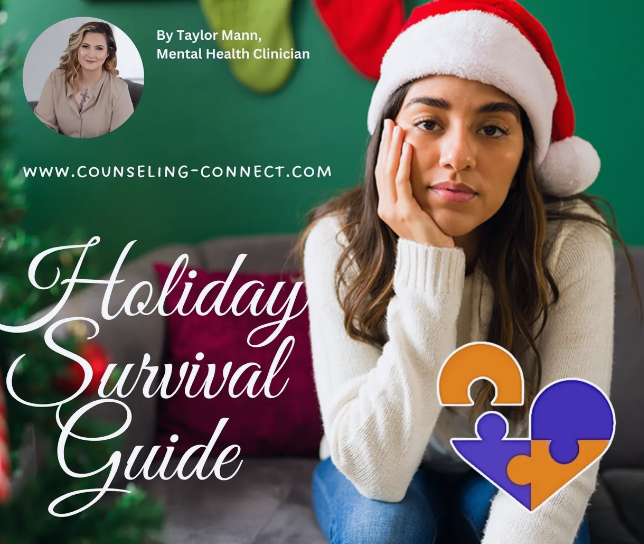By: Taylor Mann, Mental Health Clinician
Ah, December—the month of festive cheer and the occasional silent scream into a pillow. December is not just a month of festive celebrations; it’s also the time to embrace National Stress-Free Family Holiday Month. Picture this: a holiday season filled with joy and laughter, where stress takes a vacation. In this holiday survival guide, we’ll explore practical strategies and principles—sprinkled with a dash of humor—to ensure a harmonious and stress-free holiday season for families.
The Power of Planning: Because Santa Didn’t Wing It
From a mental health standpoint, holiday planning is a vital skill for emotional well-being. It increases predictability, which reduces stress, uncertainty, and decision fatigue. Effective time management and boundary-setting contribute to a more balanced and less overwhelming festive experience. For those navigating mental health challenges, proactive planning serves as a coping strategy for managing stressors and integrating self-care activities. Planning is the fundamental tool for organizing logistics, fostering resilience, and prioritizing mental health amid the holiday hustle.
Tradition Tidings: Because Memories Are Priceless, and Let’s Face It, We’re All Broke in This Economy Anyway
Prioritizing meaningful traditions and quality time over material gifts during the holidays offers significant mental health benefits. This intentional shift fosters deeper connections and lasting memories, reducing stress associated with gift-giving. Engaging in activities like crafting, volunteering, or sharing heartfelt stories promotes fulfillment and joy derived from shared experiences. This emphasis on experiential giving cultivates a sense of togetherness and emotional richness, contributing to reduced holiday-related stress and enhancing family connections.
Open Communication and Setting Expectations: Caroling, Not Quarreling
Encouraging open communication during the holidays is a powerful mental health strategy. Instead of tiptoeing around potential stressors, it’s more effective to address them head-on. Clear communication fosters supportive environments, while asking for what we need and don’t need helps to set expectations with others. Imagine it as a mental health pregame huddle—discuss gift expectations, travel plans, and potential triggers. This upfront honesty creates a buffer against the emotional rollercoaster, offering a smoother ride through the festive season. It’s a self-care tactic, a shield against holiday-induced stress. Transparency and mutual understanding creates a supportive environment and sets the stage for a more emotionally resilient holiday experience. So, kick off those open conversations– your mental health will thank you for the stress-free cheers.
Tech-Free Quality Time: A Brief Respite from Screen-Staring
Social media is the amusement park of the internet, where we go for a quick laugh and end up spending hours wondering how you got there. It’s fun, addicting, and the reason why the phrase “I’ll just watch one more” has lost all meaning. When we’re staring at screens time stands still and our level of productivity and connection plummets… But that’s a sacrifice we’re willing to make for the sake of a dopamine hit. By stepping away, even temporarily, from screens and social media, we regain a sense of inner balance. It’s an intentional effort to prioritize real-world interactions, safeguard mental health, and avoid the unintended consequences of falling down the digital rabbit hole. So don’t forget to unplug, not just during the holiday season, but year-round. Psychologists recommend spending no more than 30 minutes on social media each day. Reducing screen time and taking breaks from the internet, phone, and social media gives us more time and energy, as well as a healthier, happier lifestyle.
Mindful Self-Care for Parents: Because Sanity Shouldn’t Be seasonal
Mindful self-care for parents is an essential component in navigating the holiday chaos. In a season where eggnog is not a substitute for therapy, sanity preservation is crucial. Taking mindfulness breaks and being intentional about practicing wellness is a form of self-compassion, whether it involves a spa day, a brisk walk to escape relentless caroling, or a moment of silent contemplation while judging the Christmas tree’s symmetry. As the holiday frenzy unfolds, it’s a reminder that a serene parent is the holiday miracle that no one talks about.
Conclusion:
From a mental health perspective, the power of planning during the holiday season extends beyond logistical considerations. It becomes a proactive coping strategy and protective factor for emotional well-being. It offers a sense of empowerment, predictability, and stability. When we embrace planning as a mental health ally, we can navigate the holidays with greater resilience and have a positive and fulfilling experience for ourselves and our loved ones.
Resources:

